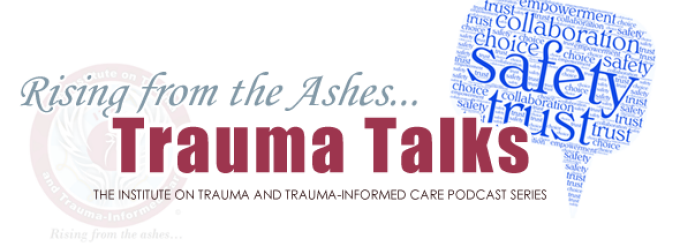
Interviews on Mental Health and Trauma
The following interviews are both personal accounts of individuals with mental illness and mental health service providers talking about their work with trauma survivors. All interviews highlight the role of strength and resilience in survivor's journeys toward growth and healing.
Dr. Agnes (Provider)
11/9/15 - Dr. Agnes is a general practice psychotherapist and family physician. In this podcast, she talks about the various types of therapy she provides her patients and how she decided to transition from being a family physician to specifically focusing on counseling. Dr. Agnes talks about the strategies utilized at her office to establish safety and trust with patients and to empower them with choice and collaboration. She reflects on the power of a counselor's language and words, the physical space and the need to frame patient's trauma from their own perspective.
Keywords: family physician, general practice, psychotherapy, counseling
- Interview with Dr. Agnes
Yvonne (Provider)
1/15/16 - Yvonne is a service provider in the field of addiction and mental health. In this podcast, she recounts how she came to be interested in the field, particularly in the wake of a close friend's suicide. The organization where Yvonne works deals with assessment, referral and outpatient services, primarily for issues of substance abuse and gambling/gaming addiction. Yvonne reflects on the social stigma attached to mental illness and addiction and how her agency frames problematic behaviors as survival skills clients have had to employ in the past. Yvonne expounds on how the five principles of trauma-informed care are infused into every element of their services and physical space, as well as the relationships between the various levels of staff.
Keywords: addiction, substance use, trauma assessment
- Interview with Yvonne
Francoise (Provider)
3/16/16 - Françoise Mathieu, Co-Executive Director of TEND Academy and specialist in high stress workplaces, is a sought-after speaker and educator in Canada, the U.S. and around the world. In this podcast, she talks about how she ended up in the field of compassion fatigue and secondary/vicarious trauma (and defines these terms for listeners). She discusses TEND Academy's work to improve the health of staff, thereby allowing workers to provide the most effective services to clients. Françoise stresses the importance of having knowledge of trauma and ACEs, particularly for providers and workers who have a high impact on clients. She reflects on the presence and absence of trauma-informed care principles she has seen in her work with TEND Academy. In reflecting on the principles, Françoise emphasizes the power of language, seeing people as the experts of their own lives, and the importance of leadership buy-in. You can visit TEND Academy's website.
Keywords: provider stress, high stress, workplace, compassion fatigue, burnout, vicarious trauma
- Interview with Francoise
Lauren (Provider/Survivor)
10/7/18 - In this podcast, Lauren discusses her own history of mental health and how her history has influenced the progression of her career. She explains the work she has done in the mental health field and states that she sees her current role as "a bridge between the mental health community and the general population." She discusses how she has intentionally reflected on her childhood, what happened to her during this time period and how it has impacted her own personal development. Lauren also reports her first experiences with service providers and how the use of the principles of trauma-informed care impacted the therapeutic relationship she had with various providers. Additionally, she emphasizes the importance of self-reflection in order to heal, recover and feel liberated.
Keywords: liberation and recovery, oppression, anxious, fear, insecure
- Interview with Lauren
Leah (Provider/Survivor)
10/7/18 – In this podcast, Leah shares her experiences with mental illness, specifically suicide and suicide prevention. Leah is a trainer at the National Center for Trauma-Informed Care; she is passionate about bringing a trauma-informed perspective to youth suicide prevention efforts. She discusses how she has found meaning in her own experiences with intergenerational trauma and mental illness. She explains how important it was for her to receive positive messages from role models in her life and how this has been influential in her finding strength and resilience within herself. She discusses her involvement in a recovery movement that promotes a paradigm shift in how society understands and responds to mental illness, trauma and suicide. She explains how activism and advocacy helped her get her power back, reclaim her voice and narrative and be a part of the solution. She reports about how the presence and absence of the principles of trauma-informed care in her life have impacted her.
Keywords: internalize, intergenerational trauma, poverty, shame, secrecy, judgement, advocate
- Interview with Leah